What do university Covid outbreaks mean for Scotland's students?
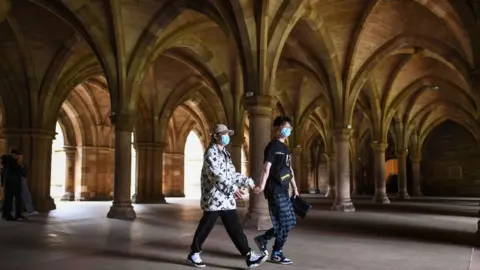 Getty Images
Getty ImagesMore than 1,000 students across Scotland are self-isolating after cases of Covid-19 were identified in student accommodation in Glasgow, Dundee and Aberdeen.
So what do students need to know about life on campus in the time of coronavirus? We've put together the answers to some key questions.
Can I go out?
The principals of all of Scotland's universities and the Scottish government have agreed on some tough new rules for students. So for now, students cannot socialise with anyone outside their household.
That means no parties, no visits to the pub, restaurants or any other hospitality venues this weekend.
Universities will increase the staff presence to enforce rules and give welfare help and advice and they will ask private providers of student accommodation to do the same.
Police Scotland are also being asked to keep an eye on student behaviour off-campus and a strict "yellow card/red card" system will be brought in to deal with breaches that put students and others at risk.
And all students must download the Protect Scotland app.
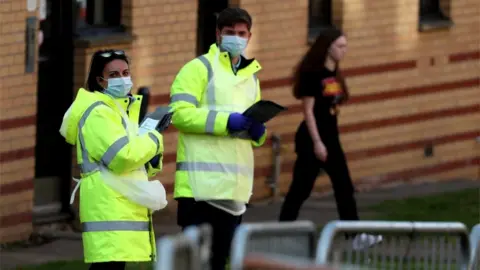 PA Media
PA MediaCan you go home at weekends?
Students who have left their family homes are considered to have formed new households with those they are now living with.
That means they cannot go back home, as households in Scotland are not allowed to mix inside homes.
These measures will be reviewed every three weeks.
There was some confusion about this after the Scottish government initially confirmed to BBC Scotland that students who had moved out should not return to their family homes.
Then the national clinical director Prof Jason Leitch said students in halls could return home for the weekend - as long as they are not self-isolating and do not have Covid symptoms.
But he has since said they cannot return home because they are now in separate households. He tweeted: "The law is clear: they can't meet indoors with another household - even mum and dad. Sorry."
Allow X content?
There are exceptions - for example, to provide care for someone who needs it and for extended households.
How do you self-isolate at university?
It's essential anyone with Covid-19 symptoms self-isolates immediately and uses the NHS website to book a test.
The entire household needs to self-isolate - even if just one person has symptoms. This means staying at home and not attending classes or social gatherings.
If the test comes back negative, self-isolation can end for everyone. If the test is positive, Test and Protect will be in touch.
Public health officials say it is "vital" those self-isolating do so for a full 14 days.
You should remain in your accommodation - and not go out for any reason, not to attend classes or even to buy essentials like food.
Ask friends who are not self-isolating to get your shopping, or arrange to have it delivered to your door.
During this period you should avoid close contact with others you are living with. Stay 2m away from everyone.
Keep the number of people in shared areas to an absolute minimum.
Do not share towels or clothes. Sleep alone. Clean shared toilets, bathrooms and kitchens after every time you have used them.
Keep washing your hands for 20 seconds with soap and water.
And remember, your college or university can provide you with advice and support.
How do you get a test?
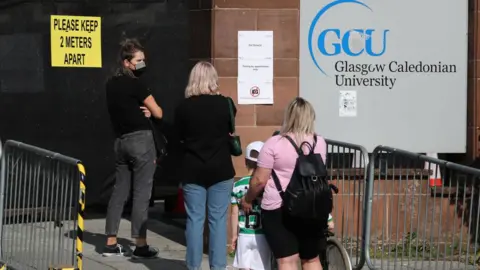 Getty Images
Getty ImagesStudents with coronavirus symptoms can book a test through the NHS.
Those who have their own car can go to a drive-through testing centre.
But there are also walk-through test centres being set up in some areas.
Walk-in testing centres in Glasgow city centre and St Andrews are already open.
A walk-in test site in Aberdeen opened on Thursday and a centre in Edinburgh will open on Friday.
Additional sites will open in Glasgow on 2 October and Stirling on 5 October, and new sites are being identified in Dundee.
Mobile testing centres have also been used at Abertay University and at Murano St student village in Glasgow.
The incident management team managing the outbreak at Parker House in Dundee have decided to test every resident, and will deliver home-testing kits to all students in the accommodation.
Why are halls of residence open? How many students live there?
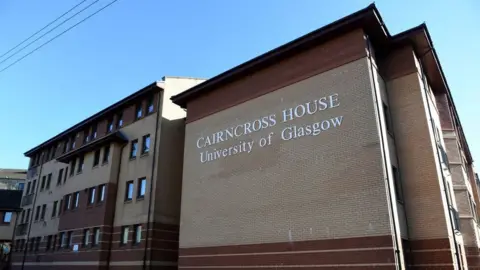 Getty Images
Getty ImagesUniversities Scotland says allowing student accommodation to open means students can attend the university of their choice.
Some students live far away from their university and can't travel back and forth.
Almost 49,000 new students gained places at Scottish universities this autumn, according to UCAS.
More than half of those are likely be in university-run halls of residence, with at least 27,000 places available across the country.
The highest numbers of students in university accommodation are in Edinburgh and Glasgow, with an estimated 10,000 students living in halls in the capital.
There are also sizeable student populations in Aberdeen, Dundee, Paisley, Stirling and St Andrews - which alone has 4,000 spaces available in university-run accommodation.
Are universities doing face-to-face teaching?
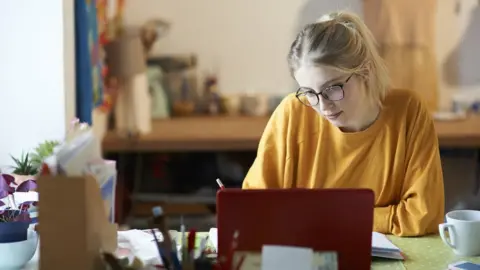 Getty Images
Getty ImagesIn many universities and colleges, a blended approach is being taken - so teaching will happen both online and in person.
Universities Scotland said universities "are offering on-campus experience for students where it is safe and practical to do so and is key to their learning".
This will be limited to small seminar groups, lab and practical work - where this in-person learning can take place within the guidelines.
Can students use shared facilities - like gyms and libraries?
 Getty Images
Getty ImagesJust like similar facilities off campus, libraries, cafes and gyms are open - but there are public health measures in place to try to stop the spread of the virus.
For example, social distancing measures are in place. In many circumstances, capacity has been reduced considerably.
Edinburgh Napier University said its campus capacity has been reduced to 30% of normal capacity.


Use the form below to send us your questions and we could be in touch.
In some cases your question will be published, displaying your name, age and location as you provide it, unless you state otherwise. Your contact details will never be published. Please ensure you have read the terms and conditions.
If you are reading this page on the BBC News app, you will need to visit the mobile version of the BBC website to submit your question on this topic.
